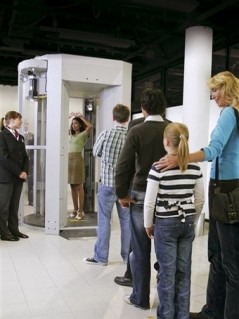TSA Puts Off Safety Study of X-ray Body Scanners
November 16, 2011
Previous independent observations and studies have signaled how the body scanners do cause cancer due to the radiation. Furthermore, airport scanner operators have been diagnosed with cancer a few years after working next to the machines.
by Michael Grabell
ProPublica
November 16, 2011
The head of the Transportation Security Administration has backed off a public commitment to conduct a new independent study of X-ray body scanners used at airport security lanes around the country.
Earlier this month, a ProPublica/PBS NewsHour investigation found that the TSA had glossed over research [1] that the X-ray scanners could lead to a small number of cancer cases. The scanners emit low levels of ionizing radiation, which has been shown to damage DNA. In addition, several safety reviewers who initially advised the government on the scanners said they had concerns about the machines being used, as they are today, on millions of airline passengers.
At a Senate hearing after the story ran, TSA Administrator John Pistole agreed to a request by Sen. Susan Collins, R-Maine, to conduct a new independent study [2] of the health effects of the X-ray scanners, also known as backscatters.
But at a Senate hearing [3] of a different committee last week, Pistole said he had since received a draft report on the machines by the Department of Homeland Security’s inspector general, or IG, that might render the independent study unnecessary.
“My strong belief is those types of machines are still completely safe,” Pistole said. “If the determination is that this IG study is not sufficient, then I will look at still yet another additional study.”
According to a summary obtained by ProPublica, the inspector general concluded the machines are within industry standards for radiation exposure limits. But the summary also suggests the report focuses mostly on how the TSA monitors and maintains the machines. The full report won’t be released for several weeks.
“I hope the Obama administration is not backing away from an independent study of the health effects of these radiation-emitting machines,” Collins said in a statement to ProPublica. “What I asked for — and what the administrator committed to — was an independent study on the health effects of [the] machines, not just a study on whether TSA is doing an adequate job of inspecting, maintaining and operating” them.
The inspector general’s report calls on the TSA to ensure that radiation surveys are conducted for unintended emissions, that calibrations are consistently documented and that airport screeners complete annual radiation safety training. The inspector general also advised the agency to determine how much on-the-job training is needed for screeners who operate the backscatters and to ensure that accidental radiation overdoses are properly reported.
It’s unclear whether the recommendations resulted from any problems found during the investigation, or are general reminders about best practices. It’s also unclear whether investigators measured the radiation doses from the machines themselves or relied on inspections conducted by the manufacturer.
The TSA uses two types of body scanners [4]. With the backscatter machines that have been the focus of health concerns, a passenger stands between two large blue boxes and is scanned with a pencil X-ray beam that moves rapidly left to right and up and down the body. With the other kind of scanner, called a millimeter-wave machine, a passenger enters a chamber that looks like a round phone booth and is scanned with a form of low-energy radio waves, which do not strip electrons from atoms and have not been shown to cause cancer.
In recent years, the TSA has commissioned tests of the X-ray scanners by the Food and Drug Administration and the Johns Hopkins University Applied Physics Laboratory. In addition, survey teams from the Army Public Health Command visit airports to check the machines.
Those tests have all shown that the X-ray scanners emit extremely low levels of radiation, equivalent to the radiation received in a few minutes of flying. But the tests haven’t doused questions from some outside radiation experts about why the TSA doesn’t use only the millimeter-wave machines, which the agency also deems highly effective.
The European Union on Monday prohibited the use of X-ray body scanners [5] in European airports “in order not to risk jeopardizing citizens’ health and safety.”
But others have pointed to problems with millimeter-wave machines. Germany announced earlier this year that it would forgo the machines after concluding that they produced too many false positives.
There are currently 500 body scanners, split about evenly between the two technologies, deployed in airports. The TSA plans to deploy 1,275 backscatter and millimeter-wave scanners covering more than half its security lanes by the end of 2012 and 1,800 covering nearly all lanes by 2014.

 Because freedom – that greatly advertised American concept – was effectively taken away from the people, with the creation of the Department of Homeland Security. Under the new Patriot Act, The Federal Bureau of Investigation began probing almost every second of every life in the country and when people wanted to leave the country, the Transport Security Administration probed them. The Big German-sounding Brother was fully established, the people living in the ‘land of the free’ under surveillance at all times.
Because freedom – that greatly advertised American concept – was effectively taken away from the people, with the creation of the Department of Homeland Security. Under the new Patriot Act, The Federal Bureau of Investigation began probing almost every second of every life in the country and when people wanted to leave the country, the Transport Security Administration probed them. The Big German-sounding Brother was fully established, the people living in the ‘land of the free’ under surveillance at all times.

